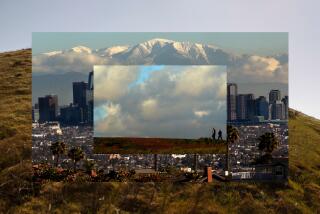Zip-lining adventures are sprouting up

- Share via
The reality of the height and speed at which I was traveling didn’t hit me until almost halfway through the zip-lining course.
Joel Hunt, my 23-year-old guide, told me that the fourth and highest line — the one I was about to ride — was known as the most spine-tingling.
I quickly found out why. After easing off a wooden platform secured to a Douglas fir, I sailed through a cluster of treetops and then watched as the ground gave way below me. Suddenly, I was 30 stories in the air, hurtling toward a mountain, the oaks and pines and streams that litter the floor of the San Gabriels smirking up at me, the Mojave Desert on my left, Hunt just a tiny, faraway speck on the side of a massive cliff toward which I seemed to be careening at 45 to 65 miles per hour.
FOR THE RECORD:
Zip-lining: In the March 31 Saturday section, an article about Southern California opportunities for zip-lining should have made clear that the Flightline Safari zip-lining course is at the San Diego Zoo Safari Park, not the affiliated San Diego Zoo. —
I had to remind myself that this is what I signed up for, this was the whole point of the day.
Spine-tingling, indeed.
The thrill-ride-cum-nature tour I was on has its roots in a strategy developed by environmental scientists in Costa Rica so that they could move easily between trees in the rain forest to study the ecosystems. It has since turned into a must-do for adrenaline junkies, with zip-line tours for the masses sprouting up from Australia to China to South Africa.
In the U.S., there are more than 200 courses — up from about 10 a decade ago, says James Borishade, executive director of the Assn. for Challenge Course Technology. Some are popping up in unexpected places: one was erected at the Super Bowl this year; another was installed in 2010 over downtown Las Vegas (presumably not as a way to study the surrounding vegetation).
Borishade suggests finding a course that was built by someone who is accredited or one that’s visited annually by an accredited inspector. Safety standards for zip lines are set by the ACCT, which also offers accreditation for companies and individuals that build courses (requirements for meeting those standards vary from state to state).
Navitat Canopy Tours, where I was, opened in July in Wrightwood, about 11/2 hours northeast of Los Angeles, joining a handful of other zip-line courses in Southern California. It offers a 31/2-hour airborne tour of the forest. The course, designed and installed by Bonsai Design Inc., looks like something out of a “Berenstain Bears” book. Curved tree branches form neat stepladders that give way to pristine rope and wood bridges. I half expected to see a bird alight on someone’s shoulder and begin chirping out a Disney melody.
As we made our way between the treetops and along the few hiking trails that are laid out on the ground, our other guide, 27-year-old Sean Hennessy, pointed out various natural features: sugar pines that smell like cocoa butter, incense cedars, brooks that attract deer and mountain lions, and tree branches that are sometimes populated by red-tailed hawks.
The goal of the course, he explained, is not just to introduce visitors to the thrill of hauling themselves off a platform and flying at massive speeds from one tree to another but also to acquaint them with the intricacies of the mountain from a vantage point that doesn’t involve a car window and a steering wheel.
“We want you to see the forest,” he said, “from a different perspective.”
More to Read
Sign up for The Wild
We’ll help you find the best places to hike, bike and run, as well as the perfect silent spots for meditation and yoga.
You may occasionally receive promotional content from the Los Angeles Times.






